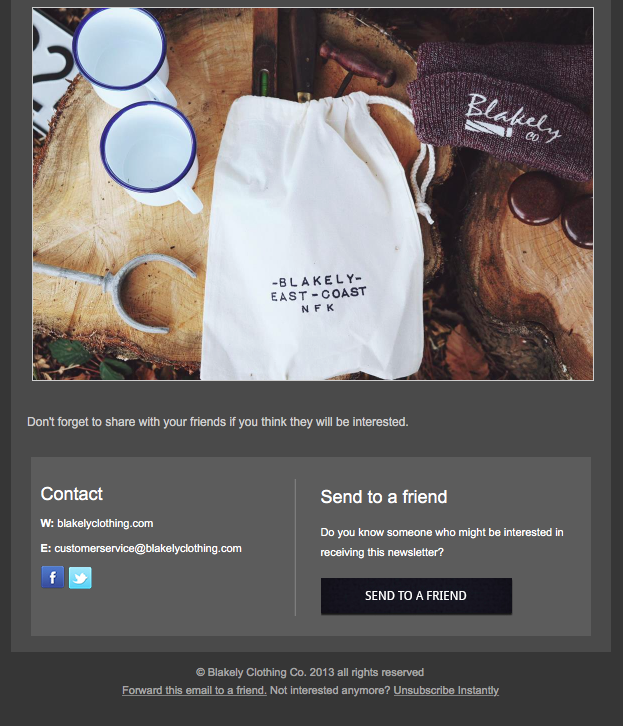After reading an article on ‘Email Marketing as a Popular Type of Small Business Advertisement‘ it made me think about what makes me delete or open an email in my inbox. Could it be the brand, subject line or the need to find out more? With the growth of internet marketing, small businesses can take advantage of email marketing through best practice.
According to Mohammadi, et al, (2013), industry experts say small businesses are slow to adopt email marketing practices. How has Blakely Clothing used best practice to entice me to open the email and start the purchasing process?

Subject line:
The subject line is vital in increasing open rates. According to MailChimp (2015), the best subject lines are short, descriptive, and provide the recipient with a reason to open the email. For a subject line, Blakely Clothing has used: Exclusive Subscriber’s 20% Discount – Blakely Clothing. This is effective, as it is short and to the point, offering subscribers 20% discount. It avoids using common words that trigger spam filters and words associated with sales that make a subscriber ignore such as “percent off” or “reminder”. By using the words “Exclusive Subscriber”, this makes the recipient feel valued as a customer, increasing the chances of the reader opening the email.
MailChimp offers tips for best practice on subject lines:
http://kb.mailchimp.com/campaigns/previews-and-tests/best-practices-for-email-subject-lines
Personalisation:
Blakely Clothing has directly addressed the reader with their name, making the email feel personalised and important. This helps build loyalty and trust. Following this, they say “thank you to all of our customers that have signed up to our newsletter and who have bought from us already we’re giving you first use (and extra discount) of a discount code before we release it to our social media” making the reader feel valued. This will help Blakely Clothing increase brand loyalty and can result in subscribers spreading the word to fellow friends through word of mouth, increasing brand reputation.
Permission/opt-out:
Permission Marketing encourages consumers to participate in a long-term, interactive marketing campaign in which they are rewarded in some way for paying attention to increasingly relevant messages (Godin, 1999). You should only send an email to a customer who has granted permission to do so. If you do not ask for permission, customers will likely tag your email as spam. Using an automated email marketing system is crucial for properly managing customer subscriptions. Opt-in email is a prime example of permission marketing where, according to Krishnamurthy (2001), Blakely Clothing use a direct maintenance model, making it easy to manage this. Blakely Clothing addresses this well, stating at the top of the email why/how the email has been received.
Also offered at the top of the email is an instant opt out option. This is best practice for customers who no longer want to receive the email marketing, as you need to ensure you can opt-out through a single step (at the click of a button). It is extremely important for those investing in email marketing to fully read and understand CAN-SPAM laws regarding opt-out requests from customers (Mohammadi, et al. 2013)
What should Blakely Clothing consider for future email marketing?
Blakely Clothing could consider the following in their future emails:
- Utilise email marketing automation and send emails depending on subscribers spending habits. So far, I have not seen a pattern in receiving their emails. If Blakely Clothing can implement this, they could increase their revenues.
- Use triggered emails to up-sell and cross-sell to subscribers logged in to the website. After a customer has looked at specific products, but not purchased, send an email offering a limited time offer on the product not purchased.
- Use A/B Testing – the same email was received a couple of days later, but with a different subject line “Blakely Subscriber’s 20% Discount”. This is good to do this, but the content was exactly the same. Blakely Clothing should change the wording within the email and use A/B testing to find which messaging best suits certain subscribers.
Conclusion:
Overall, the email sent from Blakely Clothing follows best practises. It is very clear and to the point making the probability of the clickthrough rate and conversions on the landing page higher. The core purpose of the email is clear, being easy to read, telling subscribers what to expect. This email is a good example of how small companies should stick to best practices when using email marketing.
For more information on email marketing and further tips for small businesses, visit http://www.forbes.com/sites/katelee/2012/10/15/15-email-marketing-tips-for-small-businesses/
References:
Godin, S. (1999). Permission marketing: Turning strangers into friends and friends into customers. Simon & Schuster.
Krishnamurthy, S. (2001). A comprehensive analysis of permission marketing. Journal of Computer‐Mediated Communication, 6(2), 0-0.
MailChimp, (2015). ‘Best Practices For Email Subject Lines’. Available at: http://kb.mailchimp.com/campaigns/previews-and-tests/best-practices-for-email-subject-lines [online] Accessed 7 Nov. 2015
Mohammadi, M., Malekian, K., Nosrati, M., & Karimi, R. (2013). Email Marketing as a Popular Type of Small Business Advertisement: A Short Review. Australian Journal of Basic and Applied Sciences, 7(4), 786-790.

